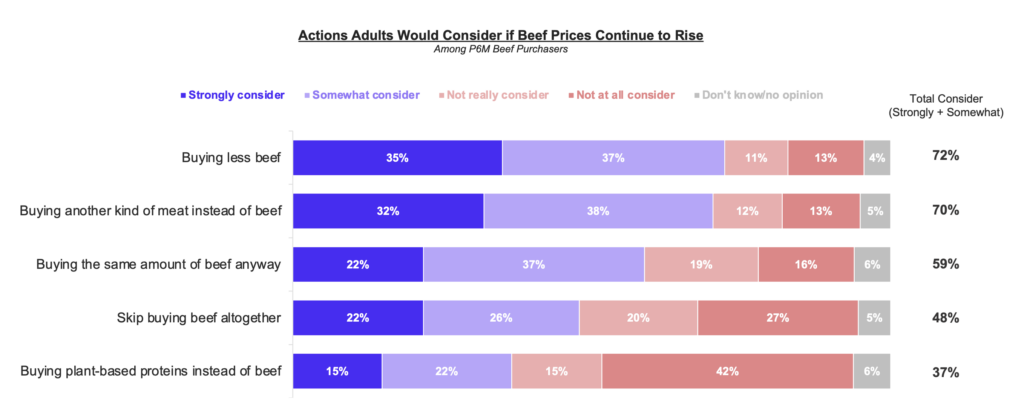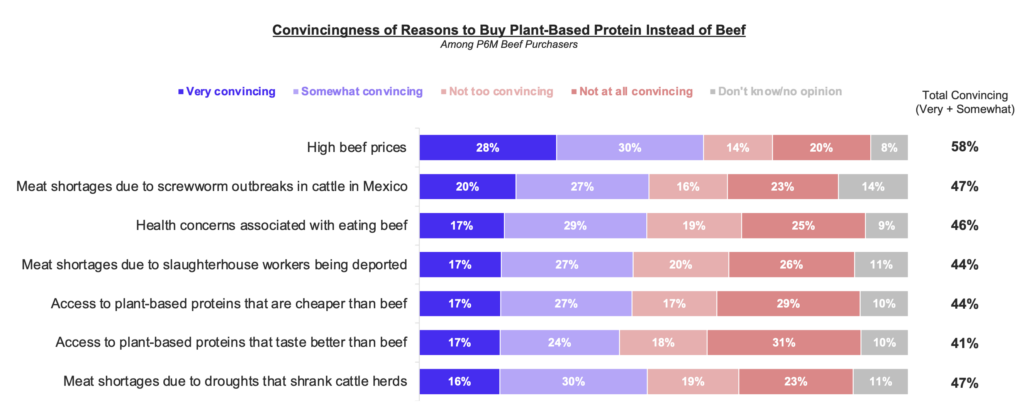
A majority of Americans are buying less beef or giving it up altogether in response to record-breaking prices, a trend set to continue as costs continue to rise.
In August, average ground beef prices reached $6.32 per lb in US cities, up by 14% from last 12 months ago. In contrast, the rate of overall inflation was 3%.
Beef has never been more expensive in the US, breaking the all-time record every month since March. It’s a combination of cattle herd inventories falling to their lowest in 70 years, climate-change-induced droughts destroying grazing pastures, and the soaring demand for animal protein.
And consumers are feeling the effects. In the last six months, 72% of Americans have noticed that beef has become costlier, according to a 2,200-person survey by Morning Consult and the Physicians Committee for Responsible Medicine (PCRM).
The price hikes have led nearly half of the respondents (48%) to reduce the amount of beef they buy, with another 12% giving it up altogether.
If beef continues to become more expensive, as has been predicted, 72% of Americans would consider buying less of it, and 48% would remove it from their grocery lists.
Gen Z most likely to keep buying beef – but also plant-based meat

The poll, conducted in early September, revealed that with the knowledge of rising beef prices, 69% of Americans would consider buying less of it next time they go to the supermarket. That intention rises with age, from 65% of Gen Zers and millennials to 67% of Gen Xers and 75% of baby boomers.
Interestingly, 43% of Americans would think about skipping beef altogether in their next visit to the store, though the trends are reversed here, with Gen Z consumers most likely to say this (46%) and boomers the least (40%).
In the long term, 68% of Gen Zers and millennials would buy less beef if prices continue to rise, which is echoed by around three-quarters of Gen Xers and boomers. And seven in 10 Americans would rather purchase another type of meat if beef keeps getting more expensive – men (72%) are more likely to say this than women (68%).
When it comes to plant-based proteins, only 7% of Americans have resorted to buying these products in response to high beef prices, but 35% will consider doing so on their next trip to the grocery store. If the cost of beef continues to climb, this would rise to 37% in the long run.
While Gen Z Americans may be less willing to reduce beef consumption than other demographics, they’re also the most open to plant proteins – over half of them (52%) would think about buying vegan products if beef prices keep rising, versus just 19% of boomers.
“We believe this signals the future of food production, with more healthful plant proteins replacing the inefficient and environmentally costly production of meat,” Anna Herby, a nutrition education specialist at PCRM, tells Green Queen.
An opportunity for plant-based proteins

PCRM asked the survey participants about the most convincing factors to switch to plant-based proteins, and high beef prices were by far the top reason, cited by 58%.
Meat shortages, either as a result of screwworm outbreaks in cattle in Mexico or shrinking cattle herds, were chosen by 47% of Americans as reasons to shift to plant proteins instead.
Meanwhile, 46% of Americans are concerned about the health implications of eating beef – the high saturated fat and cholesterol content, combined with the lack of fibre, has linked red meat to conditions like heart disease, cancer, and type 2 diabetes.
For 44% of consumers, turning to plant proteins is appealing due to meat shortages caused by the deportation of slaughterhouse workers.
“In Nebraska, a slaughterhouse recently experienced an immigration raid, and given that there are other incidents, the current administration’s immigration policies could lead to a shortage of slaughterhouse workers,” says Herby.
“Producing plant protein requires fewer workers. Overall, it’s much more efficient to raise food for people to eat directly rather than hire workers to raise crops to feed to cattle and then employ another set of (mostly immigrant workers) to slaughter the cattle,” she adds.
Finally, in a finding that will pique the interest of plant-based meat producers, 44% of Americans would buy these proteins instead of beef if they’re cheaper (as of 2024, the average price gap stood at 14%), and 41% would do so if they tasted better – some already do.
The post As Prices Hit Record-Highs, 60% of Americans Are Buying Less Beef appeared first on Green Queen.
This post was originally published on Green Queen.